
NEWS ARCHIVES 2006
ECLA GUEST LECTURE: Dr. Sean Allan - History, Memory and Fantasy in 'Good Bye Lenin!'
December 20, 2006
By Clara Sigheti (2007, Romania)
Ostalgie is a German term composed of Ost (East) and Nostalgie (nostalgia). It refers to the history and culture of the GDR, and relates to former East Berlin - the current location of ECLA. The film screening of 'Good Bye Lenin!' followed by the guest lecture by Dr. Sean Allan from the University of Warwick took place in the last week of the academic term.
The first part of the lecture addressed how contemporary German cinema depicts the past and how the GDR was represented in post 1991 films. As Dr. Allan described, earlier post-reunification cinema tended to be more dramatic, because directors made films which they could not do in the former GDR. In contrast, later the employment of comedy to depict a traumatic past has proven quite popular, with more than five million people viewing 'Good Bye Lenin!' in the first two weeks after its release.
'Good Bye Lenin!' presents a universal narrative: the love between a mother and her son, the idyllic personal memories of childhood stretched into collective impressions of the period. The world of East Germany reconstructed and performed by the film characters intensifies the Ostalgie phenomenon. East German lifestyle recreated by the characters becomes what they would have wished the GDR to be in reality - in the words of Dr. Allan "the ultimate Ostalgie".
Coming to terms with the past has its own German word: Vergangenheitsbewältigung. The way in which nostalgia and memories are connected in the film allows for 'Good Bye Lenin!' to escape the political background of the period. This personal, humane approach to political events, with emphasis on the individual, who is affected by history, is the current approach of new German cinema addressing Germany's past.

- Tracy Colony speaking to Professor Rapp
ECLA GUEST LECTURE: Christof Rapp on "Emotion and Reason in Aristotle's Ethical Thought"
December 18, 2006
By Tracy Colony (Faculty)
On the 13th of December, as the concluding lecture of this semester's Academy Year Program, ECLA welcomed Professor Christof Rapp for a lecture on the theme of emotion and reason in Aristotle's ethics. Professor Rapp holds the chair of Ancient and Contemporary Philosophy at Humboldt University here in Berlin and is a leading figure in the field of Aristotle studies. Among his many other projects, he has recently co-edited the book: Wissen und Bildung in der antiken Philosophie.
Professor Rapp's presentation on Wednesday morning began by articulating how Aristotle understood the emotions and the ways in which they were to be distinguished from judgments. From this perspective, he then developed an interpretation of the specific roles played by emotion and reason in Aristotle's understanding of ethical training. Professor Rapp's exacting elaboration of this theme was very well received by students and faculty alike, who, over these last weeks, have been reading Plato's Republic and Aristotle's Nicomachean Ethics. In many ways, Professor Rapp's lecture was a very fitting conclusion to this semester's study of ancient Greek philosophy.

STI-HILE NAACHT ... HEI-LIG-E ... NAACHT ...
December 15, 2006
By Judith Schmid (2007, Germany)
Christmas is coming. For people at ECLA, it is not too early to have a Christmas party, as the end of term rapidly approaches. And of course, no one should miss an opportunity to have a Weihnachtsfeier.
On Tuesday night, the whole ECLA community, students, faculty, administration and family members met at the Yellow House, the residence of president Larry Boetsch and his wife Elizabeth. Guests were warmly welcomed by the light of candles and lanterns leading up to the entrance door. The atmosphere was very cosy: candles, lights, and, most importantly, a Christmas tree.
The banter of conversation gradually crescendoed as guests trickled in. ECLA's chef, Roger Langkamp, offered a special highlight for empty stomachs: the Christmas dinner, consisting of a turkey with rosemary and cranberries and ending with an assortment of Christmas sweets. Larry admonished guests to leave no crumb uneaten. This endeavour failed slightly as the amount food was "beyond human capacity to endure" to quote Thucydides, but the sweets were easy to dispose of: one night in a dorm kitchen did the trick! (And a sign saying: "Don't touch those sweets, they're mine!" made it even more effective.)
What would a Christmas Party be without Christmas carols? This was the responsibility of the ECLA choir under the instruction of Michael Geisler. Multilingual carols were performed by six devoted singers and "angel-like voices rose to the air" in Latin, French, English and German: Nowell, nowell, Glooo-hohohohoho- ooooooooria, Sti-hi-lle Nacht… , crowned by Daria Coscodan's solo piece "Holy Night".
The eating, chatting, singing and joking continued into the evening. Some people used the opportunity to speak to someone they had not had the chance to approach before. As the amount of cookies finally diminished and tiredness crept into eyes and faces, the guests took their leave, one after another, to return home not without a great thanks to Larry and Elizabeth for this friendly evening.
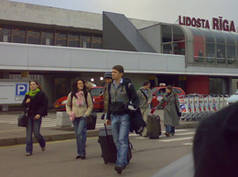
ECLA DEBATE TEAM GOES TO RIGA
December 13, 2006
By Martin Aher (2007, Estonia)
Four teams of the debate club were sent to a tournament in Riga last weekend. The tournament brought together people from 17 countries and 3 continents.
ECLA students are already accustomed to intercultural exchanges and intellectual discussions, but the clash of different Weltbilder was taken to a new level at the tournament. ECLA teams had to come to grips with controversies that were entirely new to them. The topics were carefully chosen and tested the debaters' general knowledge. Naturally, they had to debate age-old ethical dilemmas such as euthanasia, but also environmental concerns, taxation, punishment for sex offenders, amending the Japanese constitution and controversies in medicine. People from various backgrounds and experiences brought differing values and facts into the discussion.
The young ECLA teams were initially shocked by the credentials of all the experienced debaters but as Jeff Marshall mentioned: It was great to find out I am able to compete with all these people after only 1.5 months of training." ECLA even had one team breaking into the second round of debating, with Hannes Klöpper and Svetlana Ten advancing to the quarter finals. There they faced one of the strongest teams of the tournament and were able to hold their own against tournament legends: SSE Riga.
All ECLA debaters agreed that going to an intense tournament was a great opportunity to clarify one's feelings about crucial issues. Furthermore, the constant debating spurred rapid development in areas such as argumentation, structuring of one's thoughts, clarity of expression and precise vocabulary. Debating also demonstrated the usefulness of the ECLA curriculum. Even though people gave ECLA debaters strange looks in the plane when they studied Aristotle as in-flight reading, knowledge of the great philosophers allowed them to see the big picture behind mere arguments.
The trip to the tournament seems to have given new energy to all the participants. Aurelia Iatco said: "I feel much more enthusiasm for debating now that I've seen how it is done at tournaments." By discussing global controversies with only 15 minutes for preparation, debaters sharpen time management skills. If one can manage a 5 minute speech that clearly outlines the necessity of European immigration quotas and the underlying values associated with such measures, one has little fear of an upcoming essay.
The initiator of the debate club, Martin Aher, looks forward to a bright future: "There are many new tournaments in the coming months- from northern Estonia to sunny Istanbul, there are opportunities for debate almost everywhere". The club members have shown most interest in German tournaments and events in Prague. The world championships that are held in Canada this year are slightly out of reach for ECLA's novices, but many show the energy, dedication, and aspiration to speak as well as the best in the world.
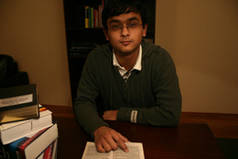
THE PROJECT YEAR - Interview with student Pranab Singh
December 12, 2006
By Clara Sigheti (2007, Romania)
Apart from the Academy Year (AY) programme, the Project Year (PY) is yet another experience that students can have here at ECLA. With a unique curriculum, structure and goals, the PY is certainly an interesting subject. With the aim of presenting this programme through the eyes of one of its students, I talked to Pranab Singh, a PY student from Nepal, about his current project.
As Pranab describes it, the PY is different from the AY in that it has no lectures and at the end of the academic year students present individual projects. For the first term the curriculum focused on Freud, while the second will be devoted to the theme of Innocence and Experience with poetry readings alongside Dostoevsky. The third term is the time to actually write the academic papers, after having chosen a topic and submitting the proposal in the Fall and deciding on methodology and conducting research during the Winter. Pranab has already decided on his approach. He is interested in aesthetics; however, he prefers to address this by focusing on what beauty is and not necessarily stopping at a philosophical approach. With this in mind, the readings on Freud brought him a new perspective on beauty, different from what philosophers argue. Pranab aims even further: "I'll try to discuss beauty in any aesthetic experience, in terms of advertising, commercialization of beauty and lifestyle".
Pranab intends to pin down the ideas of aesthetics and apply them to current realities. First on his reading list is Plato's Symposium, which he was able to learn about by also attending the AY lectures, followed by Kant's Critique of Pure Reason. Comparatively, they should aid him in first shaping "a coherent idea of beauty, starting from the fact that much of how beauty is perceived has platonic undertones. To the philosophers, there is always something better and greater beyond it". How Freud can be introduced to the modern man's aesthetic experience is one step closer to explaining current notions of beauty.
Concerned with applying ancient ideas to the contemporary world, Pranab has chosen to devote his Project Year at ECLA to aesthetics, although other students tackle completely different topics. Their projects include: the issue of authenticity in Heidegger's Being in Time (Mariel Miranda, USA), historicity in Foucault (Márton Farkas, Hungary), the psychoanalytical reading of a novel (Miriam Gagoshashvili, Georgia), the close reading of Aristotle's Ethics in regard to the practical meaning of philosophy (Aurelia Iatco, Moldova), Sergei Eisenstein's journey through Europe in the 1920's and his interaction with Berlin's artistic community (Natalia Ryabchikova, Russia), the use of theatrical elements in films, as found in Lars von Trier's works (Natalia Roman, Romania) and finally, free verse poetry (Nicole Busse, USA).
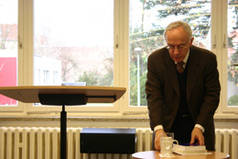
ECLA GUEST LECTURE: Anthony Price on 'Tragedy'
December 8, 2006
By Rob Boddice (Faculty)
Anthony Price from Birkbeck College, University of London visited ECLA to give two guest lectures (4th and 6th December) on the theme of tragedy in Book X of Plato's Republic and in Aristotle's Poetics. Price has published extensively on ethics and moral psychology in ancient-Greek literature and he professes an academic interest in the 'epistemology of value'. His work fits perfectly with ECLA's fall curriculum, and the students greatly benefited from his insights. Echoing Aristotle, David Hayes (faculty) drew attention to the 'astonishing' in Price's work, in its search for truth.
Price's first lecture begged serious questions of the exile of tragedy from Socrates' city-in-speech, offering, in its critique, reasons why emotional responses to theatrical tragedy were good for the soul. The seductive quality of grief and the dangers of imitation were problematised by Price, who instead offered the notion of 'quasi-grief': an emotion 'transformed by its aesthetic context'. Far from being detrimental to the balance of the separate elements of the soul, the disinterested response of witnesses to theatrical tragedy actually represented the 'epitome of the well-regulated soul'. The resultant discussion occupied all present for a further hour, before taking the theme into seminars, where the 'myth of Er' in the Republic was subjected to critical thinking in the light of Price's lecture.
Lecture two, presented as 'Aristotle on Catharsis', continued Monday's theme, asking four large questions on the nature of Greek tragic theatre. These included the evocation of pity and fear in a manner which is pleasant to the spectator (catharsis); the unity of tragedy (questions of style and content which might explain why catharsis could be 'enjoyable'); how tragedy involves the audience emotionally (through the form, through empathy and through imagination); and finally, in uniting the answers to the other three, an exploration of how tragedy is at all enjoyable. Here, in our ability to confront the pity and fear represented on stage, we are flatteringly compared to 'Aristotle's really brave man' who is reassured by his own composure. Moreover, the form of tragedy, which retains its structure (in plot, in verse, etc.) while the horror unfolds, was presented to us as a reason for its power to elate. Order emerges from chaos on stage and is immediately appropriated by the audience: 'we imagine sharing the predicament of the hero, but to an effect that asserts our own virtue'.
Price's contribution to the curriculum - his erudition and engaging style - was of considerable value, and was a fitting finale to our dealings with Plato's Republic, the term's core text.
ECLA Supports High School Students in a Business Plan Competition
December 7, 2006
By Toma Čeba ek
On December 6th, ECLA hosted an information evening introducing the Annual Student Business Plan Competition organized by the American German Business Club Berlin e.V. (AGBC). Following a welcome on behalf of the ECLA community by Toma Čeba ek, ECLA's Senior Assistant to the President, students and teachers from local high school heard presentations about the competition by AGBC members and met with the ECLA students who will be available for advice and mentoring support in the coming months. ECLA is supporting the competition as part of its effort to initiate and contribute to activities that will benefit the larger Pankow community. The competition offers attractive prizes to young entrepreneurs who develop convincing business ideas for a project or a company in Berlin. Participants can work individually or in teams and are required to submit a business plan in the English language by April 16th 2007. A jury will select finalists in May and the prizes will be awarded at a banquet in June.
ECLA students Svetlana Ten (Kazakhstan), Martin Aher (Estonia) and Timur Abenov (Kazakhstan) attended the information evening and were excited at the prospect of helping high school students from the larger Pankow area. Svetlana Ten and Timur Abenov have been pursuing degrees in Business Administration while Martin Aher has acquired relevant experience by participating in entrepreneurial activities parallel to his studies in Philosophy. At the end of the evening, Timur summarized his first impressions: "This is a nice opportunity to meet German high school students and to talk about their ideas and ambitions. I look forward to working with them and hope to help them with all the different aspects of preparing a successful business plan." Martin added: "I also enjoyed meeting the experienced businessmen who run the competition. Yet I'm curious to find out from whom I will learn more, those that have already implemented their ideas or from the students who are still generating new ones."
Further information about the competition can be found on the official AGBC website.

ECLA WEEK
Students, Faculty and Admin Come Together for ECLA Week
November 17, 2006
The days leading up to ECLA week were full of preparations: late night essay writing, the purchasing of book making and gardening supplies, sign-up lists for special workshops and concerts, debate and choir rehearsals, campaigning for student-delegate candidates and State of the World Week themes and football practice.
The faculty/student football/soccer showdown received special attention and inspiration from both sides of the field. 'We've been training for some time', states student Jeff Marshall, 'nearly every day we are out on the field shooting goals, and now we are running laps, too. It goes without saying, we are younger and stronger. We are going to win'. Rob Boddice, faculty member, counters him with, 'legendary football manager Bill Shankly said: "Some people believe football is a matter of life and death. I'm very disappointed with that attitude. I can assure you it is much, much more important than that." The ECLA faculty approach to the beautiful game is that football should be considered a liberal art. In the Socratic tradition, Wednesday's clash will concern the soul: an enlightened disposition for the victors and infinity in the cave for the losers.' Regardless of the results of the disputed game, both sides played courageously and enjoyed themselves.
While some students enjoyed the outdoors during the football match, others celebrated autumn while looking toward spring. Students and administration planted hundreds of tulip, daffodil, and crocus bulbs on the ECLA campus in the 2006 beautification project. Sheroz Negmatov explained, 'I haven't gardened since I was young at my grandfather's house. I'm happy about this opportunity. It was so much fun to work together and dig in the ground'. Lily Philipose, one of the many beneficiaries of the Beautification Project is already awaiting its results, 'A slew of admissions inquiries for next year kept me from helping with bulb-planting this Fall, but come Spring I'll be anxiously watching the flower bed outside my window for the first signs of budding tulips'.
As members of the ECLA community hang up their cleats, retire their shovels, and go back to business as usual, they hold a week's worth of fond memories together and hope for Spring as they approach the next four weeks of hard work leading up to Winter Break.
BLOG WORKSHOP: Read, write & publish online
November 17, 2006
By Clara Sigheti (AY 2007, Romania)
'I have nothing to say, but I say it regularly' was the amusing end note used by Evgeny Morozov for the workshop on blogs and podcasting. As a former student of ECLA, who now works with bloggers and journalists from Central Asia and the rest of ex-USSR, Evgeny returned during the ECLA Week with a series of interesting points.
The word 'blog' is nowadays among the most looked up words on the Internet. Blogs have evolved from being just online public diaries to sources of information, news, discussion arenas or even a way to make money. Blog themes can vary from politics to cooking or technology - however, half of the 57 million blogs that exist today are used to comment on current events and news. As can be expected, this raises a number of serious issues in regard to mainstream media.
Because bloggers have a much wider information base than mainstream commentators, and are not concerned with copyright laws and write for free, journalists are somewhat uneasy about blogging. However, the blogosphere is not yet a cause for concern because, unlike other media, it does not usually verify facts. In fact, most bloggers use mainstream media as their primary source of information. Evgeny explained that "Bloggers are playing the role of a watchdog for mainstream media" - for example by taking a stand in cases of plagiarism.
Generally speaking, blogs are a means of publicly expressing thoughts, views or facts. Unfortunately, not all bloggers enjoy the privilege of free speech, as more than 30 persons have been jailed for the political content of their blogs. In Asia, blog censorship is a sad reality.
RSS (Real Simple Syndication) was yet another subject brought into discussion during the workshop. This technology allows for customizing online news in real time, making it easier to receive news of interest without having to browse each site, which is a time consuming process. It makes it possible to have news downloaded directly to the desktop or to be automatically updated with all new articles on the subjects of the user's choice. The practical part of the workshop also offered instructions on how to start a blog and how to use RSS.
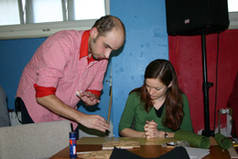
WORKSHOP: Books, books, books
November 16, 2006
By Judith Schmid (AY 2007, Germany)
At ECLA, we are surrounded by books all of the time: by Plato, Homer and Sophocles. But the book as an object is not really something to which we usually pay much attention. It is just a means to an end, an object necessary to convey the ideas and thoughts that interest us. What does the book look like? It doesn't matter. Usually.
During ECLA week, some of us may have changed our attitudes towards books. Some may have discovered that their importance does not only lie in their content, but that books can also be beautiful. And how nice it can be to worry about the colours of the cover and not whether you will manage to read the 60 pages due for next day.
Had people not invented books, we wouldn't know anything about "Western European Culture". In an opening presentation, Dinu Bodiciu, the Romanian artist leading the book binding workshop, showed us what books looked like a long, long time ago (if you could call them "books"). Just to give a few examples, at the very beginning, people used to record their ideas on stones and clay tablets, later on papyrus and parchment. Book covers were made from wood and leather. A book was something very precious and available only to few privileged people.
Books, just like people, have their own anatomy, a spine for instance. Most of all, books can be art. Dinu showed us all sorts of extravagant examples; I especially liked the pillow-book. The idea of "learning overnight" via a direct transfer from pillow into memory is quite tempting.
Theory aside, we couldn't wait to make our own diaries, notebooks, photo albums etc. Pages and covers needed to be cut, pierced and finally sewn together. The party room of Kuckhoffstrasse 24 soon filled with a happy, busy and creative crowd fighting over glue, paper, awls, chattering and laughing during work. Dinu was a great help to everyone.
Some of us developed unexpected ambitions to "outbind" our mates. Many of us were incredibly persistent. The new élan libraire kept us busy in the party room until long after midnight. With almost childish pride we presented the results of our hard work in the cafeteria: "Look what I have done!!!"
To sum up, it has been a great workshop and maybe, maybe, maybe from now on the "book itself" will command the respect it actually deserves. Books are nice objects after all, and I hope we will think twice before tossing away "The Republic" at the end of the term.
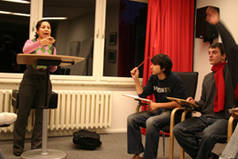
ECLA DEBATING: For & Against
November 6, 2006
By Clara Sigheti (AY 2007, Romania)
For the last three weeks the Debate Club has been meeting every Wednesday at 4pm in the Lecture Hall. Developing rhetoric skills in students is a good reason for introducing such an activity here at ECLA. However, this is not why Martin decided to be ECLA's debate trainer: 'What determined you to set up the Debate Club? Addiction.' Yes, that's right - addiction, contagious addiction.
Martin has been a debater since 2001 and became international at it in 2004. He gained most of his experience in the UK, which is why he feels so strongly about using the British Parliamentary Debate Format at ECLA, instead of the American one. As he explains, the British model is used throughout Europe, having two teams for and two against - which allows team members to be assigned different roles. In addition, it puts more emphasis on the quality of the speech, rather then on the points made, while team work is also an advantage. This makes it ideal for ECLA's non-native English speakers, because it involves 'a thousand times more rhetoric'.
What debating comes down to is fluency. A debater does not choose certain topics that are easier to approach, but uses the debate in learning how to speak better. Thus, the topic is of lesser importance 'I've heard brilliant speeches on terrible topics and the other way around.'
Martin also let us in on an unofficial rule of the game - that debaters always return the favour of learning new skills by training others. This is probably what Martin is doing now, seeing that he is planning to take our team to international competitions. With this aim in mind, having a permanent team is bad practice, since all teams should be prepared well enough to represent ECLA. Therefore, part of the preparation will be to always switch opponents and rhetoric styles.
As far as the future of the Debate Club is concerned, by the end of the year, Martin expects 'people will be able to speak less and say more'. Debating is certainly addictive and contagious at ECLA - members of the Club have just decided to also meet on weekends, whenever possible. Some topics will be announced beforehand, so as to come prepared with information. On other occasions, 'most sessions will be up for grabs' and more popular topics will prevail by democratic voting system. Martin calls out to students and faculty alike to join in.

Interview with Michael Geisler, ECLA's choir director and voice teacher
November 2, 2006
By Judith Schmid (AY 2007, Germany)
We both have got very little time and that is why we are sitting outside the cafeteria enjoying the last (?) warm day of October. I am asking questions and writing while Michael is answering and munching the delicious lunch made by Roger.
Enjoy your meal. Sorry, we need to do this in English, I know we're both German. It's kind of odd, but we can switch back and forth. So tell me please, how long have you been working for ECLA?
Since January 2006.
Were there more singers last term?
No, not really, numbers vary between 7 and 10, but at the end of last term, people dropped out because there was so much work to do.
That's a shame. Not even having time for singing. You are also conducting another choir. What is that like? Different?
I'm conducting choirs in church with a size of 35-45 singers. It's different because of the repertoire and there is much more pressure. We have concerts and need to get the program ready for that. It is not as playful as in ECLA choir where we walk around singing "Goodnight, goodnight" in the dark. In church, we have real rehearsals.
"Real rehearsals." Sounds serious.
I take both seriously.
Is the lack of male voices a common problem?
Oh yes, very wide-spread. Especially tenors.
Nevertheless, I heard Germany has got more choirs in relation to its size than any other country. By the way, are you a tenor or a bass?
Neither nor, I'm a lyrical baritone.
Please explain.
There are different sorts of baritone voices. Basically, a baritone is a medium voice between tenor and bass.
That'll do, thanks. Do you play another instrument? - Well, stupid question, of course you do.
I play the piano and the organ, as I got a degree in church music. I don't like playing the organ in services, though. I also used to play the violin and the trombone, but now I have got no more time to practise. I'm still studying voice at the university.
Which one is your favourite?
Voice, actually. I personally think the voice allows more self-expression than any other instrument. And I have been singing for a very long time and my first musical experiences were with singing.
Since your childhood?
Yes, my grandma was a singer.
You have a certain way of teaching voice. You classify people into different breathing types. Could you explain your theory?
It goes back to Erich Wilk, a doctor and musician who during World War 2 discovered that some people feel more comfortable with breathing in and lying on their back whereas some prefer breathing out and lying and prefer the stomach position.
There are areas of expansion and areas of compression in your body and you need to get them right to use your full energy. Your breathing type also depends on the gravitational influence of the moon on the earth the minute where you are born. Later, people drew more connections between medicine and music and it is quite wide-spread today.
I'm sceptical. It sounds very esoteric.
Well, I use it for my lessons and if people feel they are improving their voice, why not?
Yes, sure. One last question: Is it painful for you to hear a bad note or an unclear chord?
It can be, yes. Usually no, but some arrogant singers who consider themselves as outstanding musicians while they don't realize that they are wrong can make me aggressive.
But as soon as everyone tries his best, I'm fine. We will work on the intonation in the ECLA choir.
I'm sure we will. I've got to run now, thanks a lot and enjoy the rest of your mashed potatoes. See you.
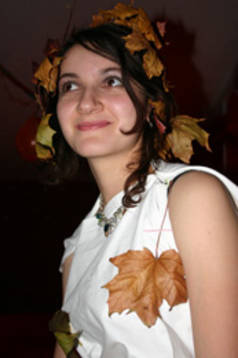
- Firouza Ganieva (AY 2007,
TRICK OR TREAT
November 1, 2006
By Clara Sigheti (AY 2007, Romania)
In the final minutes of the witching hour, after the "scary" film screening on Friday, it seemed that Halloween was over at ECLA. But the real trick or treat came with Saturday's unexpected party held by a few students calling themselves "The Horror Committee". In spite of the short notice, students and faculty alike managed to improvise some truly creative outfits, ranging from beer-bellied Falstaff from Henry the IV to the Garbage-Bag Girl, a walking advertisement for recycling.
A lot of effort was put into decorating the party room in House 24 with just about everything: spiders, balloons, evil witches and even disco lights. In this setting, students competed for the best costume award - among others, there was the Dead Hector from the Iliad, a Gorgeous Gypsy, an 80's Girl, an Italian Mafioso, the Salt and Pepper couple, a Toilet Paper Mummy, a Flower and our favourite - Autumn. We felt the competitive tension rising in the air until our judge David Hayes, disguised as Allen from Indiana, announced Anca - the Garbage Bag Girl - the victor.
The dancing and digging into sweets went on into late hours, after which the party relocated to the kitchen for the carving of the pumpkins. Late into the night, Jeff finished carving the first monster and his pumpkin, illuminated by candles, was put on display on the balcony of House 24. Lika and Eka challenged Jeff by carving a second one the next day.
All in all, it must have been the "Student Cleaning Force" who were most terrified by our All Hallow's Eve, since the mess we made would have made zombies look good in comparison.

- Jeff Marshall (AY 2007, USA), Nikki Gilbert
SEEING BERLIN SEASON OPENS: Pergamon Museum Visit
October 26, 2006
By Judith Schmid (AY 2007, Germany)
My goodness, what can I write about the museum visit? I'm certainly not an expert. I dropped art in high school. What can I say about it? Maybe that the tram ride to the Museum Insel took forever. Maybe that it was a wonderful warm night with people sitting outside and that it did not feel like winter but like summer and that I thought the museum island was such a wonderful place.
No, I don't think this is what I am supposed to write here. Probably it's more about the magnificence of the building that hosts the Pergamon or about the Pergamon Altar. It really felt as if we were in ancient Greece. I couldn't believe how old it was. Visitors studied the ancient friezes with reverence. The stones were so white and beautiful that they seemed to be from heaven rather than earth. Misleading, though, as Aya told us in her lively and light-hearted manner, because in ancient times they were painted with bright colours. It made me think about how future researchers would feel excavating a Coca Cola can in 5006 CE. Maybe it would no longer be red but archaeologists might still consider it to be a precious relic.
Mantha and Aya, who led the tour for us, gave us lots of background information. They knew an incredible amount about those works of art and the visit would not have been half as interesting without their contributions. For all those who missed the explanation on different types of Greek pillars, here they are again. (It might be quite useful whenever we feel a need to show off our classical education and impress people around us). So never forget:
Then we moved on to ancient Babylonian art and had a look at the entrance gate of Babel. I was really impressed and admired the brightly coloured glazed tiles while Aya desperately tried to remember the English word for the German Keilschrift (cuneiform writing).
On the whole, the visit to Pergamon was quite short but thanks to our museum passes, we can come back again.
I will finish now and I will not talk about how much fun we had going out afterwards to celebrate Jeff's birthday.
PLOUGH IN THE SPOTLIGHT: David Levine Receives Grant
October 25, 2006
David Levine, the founder of the Performance programme at ECLA, has been recently awarded a grant from the Kulturstiftung des Bundes (the Federal Cultural Foundation) to undertake an experimental performance project as part of the Arbeit in der Zukunft (Work in the Future) theme.
In the project, entitled BAUERNTHEATER, an actor will play the role of a farmer for one month, beginning May 2007, cultivating one hectare of land in Brandenburg for 14 hours each day. The actor in this project is both taking part in a performance as well as actually engaging in land cultivation. The land art performance highlights the dichotomy between nature and culture, rural and urban life, work and art. At the same time, it points to the future role of farmers in agriculture simulation and eco-tourism.
The project's rehearsal phase takes place in New York and the actual performance will be open to viewers in May 2007 at the Biorama-Projekt, a land art centre in the UNESCO Biosphärenreservat in Joachimsthal, just outside Berlin. The performer, David Barlow, will give a series of intensive acting workshops at ECLA during his stay in Germany.

FESTIVAL OF LIGHTS
October 21, 2006
By Clara Sigheti (AY 2007, Romania)
The buildings in Berlin can still afford a touch of animation this week, as winter is just about to take over their facades and soon enough, passers-by will prefer warmth to colour. Because ECLA students hardly know the buildings in the first place, it would be a long stretch to say that the Festival of Lights brought about a different perspective. The event was more of a good reason to get us all on the tram, searching for bits and pieces of the city.
We set out as a group, targeting a list of must-see places. In spite of the preparation, several hours had passed before we came to realize that the more determined we were to catch a glimpse of the event on our own terms, the more difficult it would get. First, we had a good look at the Berliner Dom - patterned like a colourful giraffe. After a short walk, we took the double-decker to Zoologischer Garten, in hope of admiring the light show through the window. The sightseeing turned out to be a real challenge, as the bus was crowded. So, we decided the Funkturm would be our all or nothing destination. Finally there, we bumped into a giant queue, where most of us decided to split up. Those who were patient enough stood in line for an hour and got the chance to see a serpent of light slithering in the air above Berlin.
Somewhat frustrated with the situation, we came up with a new strategy. For a change, we would ask this reluctant Berlin to reveal its buildings to us - no longer a crowd of rushing tourists, but a few patient visitors. So, we walked the streets at 3 a.m., back to the Berliner Dom where the lights were out; then took to the walkway in the middle of the street in Unten den Linden, between rows of trees decorated with neon blue. Brandenburger Tor lit up in pink felt like the end of the world, with a couple of exhausted Berliners resting on the sidewalks.
On our way home, there was hardly anyone around, except for us, meaning that the show was over and it was time for Berlin to turn back into a pumpkin and for us to have a good rest - until next time.

- ..."fifteen" cooks chopping, kneading
INTERNATIONAL DINNER
October 13, 2006
By Alicja Weikop
This year's International Dinner was unlike any other. It was based on the concept of a Progressive Dinner Party, where each stage of the meal is served by a different host and all the dinner guests have to physically move from one location to the next as the evening progresses. What a brilliant way of combining food experimentation, exercise (for better digestion) and a fair distribution of washing up duties!
The order of our evening was the following:
House 15 greeted us with Starters
House 24 had the honour of serving the Main Course(s)
House 16 had the pleasure of offering Desserts
…and all of this drawing from 17 different culinary cultures of the world!
The menu was a truly amazing mix worthy of a king. It included khachapuri (Georgian), pumpkin soup (German - click here for recipe), cocktail sandwiches (a Romanian-Estonian variation on a Texan recipe), salads (Kazakh and Turkish), curry (Nepalese in two heat versions), talmeş-balmeş (Romanian), running eggs (Chinese), gado gado (Indonesian), milk rice pudding (German) and many more wonderful delicacies. Many of us soon realised that some dishes, such as for example baklava, span continents and national cuisines, while others were a brand new experience to many a palate.
Students have proven great organisation skills serving steaming hot dishes just as the merry crowd trickled from one house to the next. As for the "behind the scenes" experience, fifteen cooks chopping, kneading and stirring feverishly in one kitchen must have been an unforgettable sight. Luckily, on this occasion no broth was spoilt (or left over).
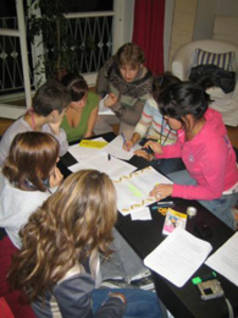
SCAVENGING TO KNOW EACH OTHER
October 7, 2006
By Clara Sigheti (AY 2007, Romania)
Knowing what to expect from the upcoming academic year at ECLA was probably the only thing missing from the students' suitcases when arriving on the 4th of October. Bearing this in mind, the Orientation Week (October, 4-8) came to their rescue, offering solutions to administrative problems, introducing students to each other, to the faculty, as well as to the city of Berlin. However, all that served only as the official aspect of their first days here at ECLA.
Behind the scenes, what the Orientation Week provided for had more to do with the setting up of a context, in which students began to relate, engage in creative team activities and discover common ground - and where there was none - creating it. A clear example of such an activity was the Scavenger Hunt held on Saturday, October 7, which in spite of not being compulsory turned out to be quite popular in House 24, where Alissa and Zsofie handed out the tasks.
Searching for clues is what students had been doing ever since arriving - clues on how to start a conversation, clues on getting to know each other. But somehow, with the Scavenger Hunt things were different. Tasks such as finding the Wasserturm, singing the national anthem in front on an embassy or even obtaining 7 restaurant menus that featured crispy duck were activities that required students to work together creatively, as extra points were granted for originality.
Suddenly, students that for the past few days had been taking language placement tests or picking up their books, all doing so individually - were now collaborating for a common agenda, as each of the three teams was formed of students living together in the same house. Scavenging implied finding ways to communicate ideas and organizing themselves in a city they hardly knew - which in a sense is exactly what the true scavenger hunt of the Orientation Week came down to.
Certainly there were arguments, little time and technical difficulties in recording completed tasks. Even more so, in the end not everyone won. Still, the Scavenger Hunt did serve its purpose - students had scavenged to know each other better.
Liberal Arts and walking dogs in the Metro-Tram or: Our first week at ECLA
October 3, 2006
By Judith Schmid (AY 2007, Germany)
It is October and it feels like winter. The weather is getting worse. People prefer to stay inside. We are beginning the academic year at ECLA Berlin, the European College of Liberal Arts.
We arrived on Tuesday, the 3rd of October, and on Wednesday, the 4th of October, from all over Europe, Asia and other corners of the globe to be bound together in an international community. To put it in a more concrete way: to move into either Kuckhoffstraße 24 or into Waldstraße 15 or 16; to discover whether you have to go down into the basement for washing your hands or if you are lucky to have a bathroom on the third floor. In turn, other people don't have a kitchen as big as yours. Hello, are you my roommate? And there have been house meetings. There are some rules, of course, there are. There are always rules.
Many things needed to be figured out on Thursday and Friday: Cafeteria? Lecture hall? Which level in your German class? French or Spanish? At ECLA people wear many different hats, they tell us. For example, the hat of a tour guide when it comes to a city walk with Tomaz. And well, we know, it is really cold outside, but let's still have a barbecue…
And by the way, what does "Liberal Arts" mean exactly? We will find out, but first we have to read three articles on that over the weekend. To be honest, in the first week it felt like at ECLA it was all about liberal eating. Only a day after the barbecue, we had the opening reception with a meal. A delicious meal. A very big delicious meal. That's how you can get started.
But don't relax, because there is work to be done. Tasks to be completed. I'm not talking about Homer or Plato or Julie Kidd. I'm talking about the Scavenger Hunt on Saturday night. You have no more than three hours to outdo the other houses. Otherwise, you will be forced to prepare desserts for the International Dinner the week after by the winning team who will be delegating the responsibilities. Be quick, but be creative, too. Both will count.
And we got out into the Pankow night, watching out for:
- foreign embassies to sing the national anthem of our home country,
- bridges (true and false),
- people to lend their beloved dogs,
- strangers who just came out of the sauna and we had to explain why we desperately needed that yellow wristband to be signed by them.
But Athena and Hera decided to give glory to House 15 and spurred strength in the hearts of each of its members.
And then it was just another rainy Sunday… good for reading, though, as it was called the Reading Weekend. Homer and Plato were waiting. On Monday, classes would start.

GESCHAFFT! ECLA's Student Community Life Coordinator Alissa Burmeister Runs the Berlin Marathon
September 26, 2006
ECLA's Student Community Life Coordinator Alissa Burmeister joined 39,999 runners from around the world for the 33rd Berlin Marathon on Sunday, September 24th 2006. Assistant to the President Tomaz Cebasek spoke with her the next day.
Hello Alissa and congratulations! The finish line of yesterday's run was as far away as they get. What does the day after feel like?
You know, the danger of this question for marathon runners is that we start sounding like we are at the doctor's office! I'm a little sore, but it's not bad. Sweet is comfort after pain…
OK, let's turn to the question of where it all began then. How did you get into this sport in the first place?
My first run was 6 km long. I didn't know if I'd be able to survive it but I decided to try. After I finished I felt that I'd accomplished something. From then on it went step by step; from three miles to seven, then to twelve and so on. I decided to run in organised races after watching my friend cross the finish line and being moved to tears with pride for her.
When did you run your first marathon and how many have you run so far?
The Berlin marathon was my sixth one. The first was in Iowa about five years ago. In between, there were marathons in Chicago, Dresden and two more in Iowa.
How do you prepare for a marathon race and what is the longest distance that you run before it?
For three months before the race, I run one long run per week. I usually start at 13 kilometres, then go to 17, 21 and so on until I reach 30, then go back in the reverse sequence. The first long runs are an opportunity to find out what works well and where the potential weaknesses are. The 30 km run builds confidence that 42 kilometres are manageable, too.
Did you like the Berlin track and do you see the city in a different way now?
Yes, it was a great track. It is flat and fast. The race is very well organised, the runners, fans and volunteers are great and this year we had nice weather, too. And yes, the run did give me a different sense of the city. Berlin is not a vast area in my mind anymore. Neighbourhoods feel connected to each other and I know it is a walkable city.
For those of us watching the race, the Berlin marathon is like a big street festival. Of course there are the professional athletes, who fly by at an incredible pace even after 30 kilometres, but the main part of it is to cheer on people who are - or so we like to think -- just like us. How does this happening on the sidewalks feel from a runner's perspective?
Well, the experience of watching a marathon was crucial for my actual desire to run one in the first place. As a runner, I enjoy the view of sidewalks. Neighbourhoods take on different personalities that celebrate and offer hospitality in different ways. Kids are particularly great. Accepting water bottles, smiles, hand shakes and -occasionally - squished bananas from them is a real highlight. And when people clap for me, I sometimes spontaneously clap back and thank them for cheering me on. The atmosphere is great.
Will you disclose any motivational tricks or strategies that you rely upon for the tough moments on the road?
I think that completing a marathon is more of a mental than a physical accomplishment. I find the marathon to be a great way to give my stubbornness a positive outlet. Small, manageable goals are also important. In tough sections of the race, I pick a goal- to make it to a distant building or to follow closely behind another runner. Also, I listen to music during the run. My strategy is to find a relatively relaxing pace for the first half, so I pick the music that keeps me from tensing up and reminds me to breathe. Yesterday, I listened to Bach's Brandenburg Concertos. Then, I had two music mixes prepared for me by my friends, and thinking of them is always motivational. However, I never wear my headphones when there is a live band playing. There were more than ten of them yesterday, from a string quintet to salsa and jazz.
What were the worst and the best sections of yesterday's race for you?
The worst was my hurting knee between the 25th and 30th kilometre. The best was the final stretch. In Berlin, it is a particularly nice one, because you come around the corner onto Unter den Linden and then see the Brandenburg gate in the distance. With that sight, you know you're almost there.
Was there a particularly creative or memorable cheer that you remember?
Well, the particularly memorable one was annoying, actually. Just about 1 kilometre into the race, someone had a sign saying: "Keine Lust mehr? Nächste U-Bahn Station 50 Meter hier lang" (transl. Are you fed up? Next metro station 50 metres this way"). I wonder what I would think of it if this person showed up 30 kilometres down the road… But most cheering strategies didn't involve this type of humour. I particularly liked a lady dancing on her balcony and all the costumes, wigs, and flags. Still, the children are my favourite.
Is this it for 2006 or are you planning another one?
One more! Dresden is coming up later this autumn.
There has been a faint rumour that the thought of running a marathon has been entertained by others at ECLA. If this rumour has any truth to it, what would your advice be? Could one prepare for it in a year?
Of course, whoever can do a total of 20 to 30 kilometres in a one-week period is ready to start training. They should count on four to five months, but even three might do. My advice is to try a shorter run first. For example, the Berlin half-marathon on April 1st is an ideal teaser and leaves the summer for marathon training. If anyone is really up for it, I always look for company on my weekend runs!
ECLA Gears Up For 2006-07 Academic Year
September 19, 2006
First came the good-byes. On September 1st, a note of sadness was present on the overall festive occasion as ECLA thanked Andrea Pomerance and Nicole Hatch for their service to the college. Honoured by the ECLA President Laurent Boetsch as "institutional co-founders", ECLA's now former registrar and librarian were joined by their colleagues and faculty members for a good-bye reception and lunch in their office building. The registrar and librarian functions are only two areas which Pomerance and Hatch had established and developed through their pioneering work in the college administration. ECLA wishes them all the best as they leave Berlin to pursue next steps in their lives and careers as far as Latin America and New Zealand.
During the recent weeks, the administrative team has also welcomed two new colleagues and reorganised its work to manage the transition of responsibilities previously held by Nicole Hatch and Andrea Pomerance. Alicja Weikop joined ECLA as Registrar and Institutional Research Officer while Alissa Burmeister has begun work as Student Community Life Coordinator. Having joined ECLA in August and September, the new team members have used the opportunity to set up their work areas before classes resume in October. ECLA welcomes them on board and wishes them much success in their work.
Staff news have not been confined to the administrative side of the college this summer. This autumn the faculty will welcome three new participants in ECLA's Post-Doctoral Teaching Fellowship Programme: Mantha Zarmakoupi (Oxford University, Classical Archeology), Geoff Lehman (Columbia University, Art History), and Rob Boddice (University of York, History). The Post-Doctoral Teaching Fellowships are designed to give young teacher/scholars the opportunity to engage fully in the interdisciplinary work of the college and to contribute to ECLA's curricular development. Finally, Kristin Voigt (Oxford University, Political Theory) will join the faculty for the winter and spring terms as a full-time faculty member.
The forthcoming faculty retreat at the end of September will serve as a forum for all members of the ECLA faculty to finish preparations for the coming academic year and to set agendas for committee work related to the introduction of the Bachelor's degree programme at ECLA. ECLA President Laurent Boetsch will also participate in the retreat.
On October 3rd, as Germany celebrates its reunification, ECLA will open its gates to a new generation of students. Classes begin on October 9th.
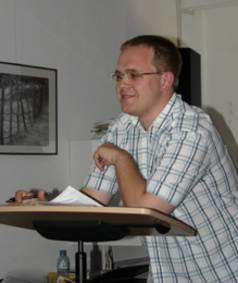
'Writing for the Public Sphere': ISU Faculty Share Their Experiences
August 15, 2006
On Monday afternoon, members of the ISU faculty and ECLA alumnus Evgeny Morozov (PY 2006, Belarus) held a Special Seminar on 'Writing for the Public Sphere'. The four panelists shared their reasons for seeking writing opportunities outside of academia and described both the pleasures and frustrations of writing for the general public.
Theodor Paleologu is the Programme Director of ECLA's International Summer University and the Ambassador of Romania to Denmark and Iceland. Paleologu's background is in Philosophy and Political Studies and he has experience in both diplomatic writing and editorializing. His opinion pieces have appeared in Romanian newspapers and for him the 'great seduction' behind editorial writing is the immediate impact it can have on politics.
Alessandra Galizzi Kroege is an Art Historian who splits her time between Berlin and Milan. Her stories and interviews discuss current issues in German art and architecture and they appear regularly in the Italian art magazine, Il Giornale dell Arte. Kroege initially began writing for the public sphere because she found it to be a refreshing break from the tedious writing she usually does in academia. She appreciates the other perks to art writing as well such as behind-the-scene tours of new exhibitions and access to interesting people in the art world.
Melinda Harvey started writing book reviews while finishing her thesis in English Literature. She did it both as a personal challenge - could she write better reviews than the ones she frequently reads? - and out of frustration - would more than five people actually read her 80,000-word thesis. Her writing does reach a larger audience now that she contributes to publications such as the Sydney Morning Herald and the Australian Book Review.
Several of Morozov's editorials, concerning Belarusian and Russian politics, have appeared in the International Herald Tribune and the Globalist, an online magazine. He got his start three years ago writing a column on education and career planning for a free Russian weekly, Akzia. A year and half later, he started a column on international affairs for the same newspaper. Morozov has been writing about politics ever since and contributes regularly to several internet magazines while maintaining his own political blog. He enjoys the flexibility and freedom that comes with freelance writing.
All the panelists agreed that writing for the public sphere requires different skills and brings new frustrations. Whether it is book reviews or editorials that you want to write, both Harvey and Morozov recommended reading as much as possible in that particular genre to improve your style. There was a general consensus that adjusting to a non-academic audience is frustrating at times. Learning to express a point in language that a ninth-grader will understand and that a time-pressed business man won't misconstrue was a major challenge for all four panelists.

ISU Spends a Long Weekend in Dresden and Meissen
August 11, 2006
By Eser Bakdur (ISU 2006, Turkey)
After a sleepless night of essay writing, we started the trip to Dresden with low expectations of what was going to be encountered. Despite its everlasting rain, Dresden quickly exceeded our expectations with its beautiful Baroque buildings, the famous Elbe, and its gorgeous night spectacle.
The first stop was Dresden's art treasure, the Zwinger. We walked there via Augustusstrasse where the fascinating Romanesque-Baroque court chapel (Hofkirche) tempted our senses. That was the first time I had ever seen such a splendid structure in my life. Back to the Zwinger, we started with the Old Masters Gallery. The Zwinger consists of the Old Masters Gallery (Gemäldegalerie Alter Meister), the Armory (Rüstkammer), the Porcelain Collection, the Mathematics and Physics Salon, the Natural History Museum (Naturhistorische Sammlungen), and the Museum of Mineralogy and Geology. In the Old Masters Gallery, we got the chance to look at Carregio, Titian (The Tribute Money), Giorgione (Sleeping Venus), Rembrandt, Dürer, van Eyck, and - maybe the most famous of all - Raphael's Sistine Madonna. Talking about the precious art works in the Old Masters Gallery's charming atmosphere and sharing time and opinions with different people were unforgettable experiences. The first day ended with a long walking tour through the city, crossing bridges with gorgeous night views and moonlight reflecting on the Elbe.
The next day started with a visit to the Sculpture Collection (Skulpturensammlung), which was founded under Augustus the Strong as a collection of classics and modern works. Immediately after, we walked through the New Masters Gallery, breathing in Expressionism. We intended to visit the Frauenkirche next; unfortunately, we could not get inside because of the unbearably long entrance line. Since we were hungry, we decided to pass to Neustadt. Neustadt was totally different from Altstadt in terms of structure. If Altstadt can be thought of as a postcard, then Neustadt should be seen as a regular German town (especially with the rain!). On our return, the Green Vault (Grünes Gewölbe) diverted us from our way. In the Green Vault, all sorts of precious jewellery, silver, amber/ivory/cur stone, and Dresden Baroques were exhibited for curious eyes. Later when darkness fell on the city, our wine ceremony started after the discovery of the arts.
On our final morning, Dresden saw us off as it had welcomed us, with rain once again. We left the city by boat, travelling up the famous Elbe to the old town of Meissen. The narrow, old-fashioned streets led us to the top of the town where we visited the late Gothic Albrechtburg castle and cathedral. Meissen is also known for its wide vineyards, wine taverns, and its world-famous porcelain. Augustus the Strong founded the first European porcelain manufacture here in 1710. After a quick visit to the Porcelain Museum, it was time to head home. We came back to Berlin with lots of unforgettable memories.

MAHLZEIT: Roger Langkamp Brings Gourmet Cuisine to ECLA
July 31, 2006
Nicole Hatch
In December 2005, ECLA's head chef Roger Langkamp started his own catering business, Langkamp Gourmet Catering. Langkamp who decided to become a chef when he was still in Kindergarten has been cooking professionally for seventeen years. He has degrees in Hotel Management and Catering Management from Wihoga in Dortmund - one of the best Hotel Management Schools in Germany - and held several management positions in large catering companies before launching his own business. Langkamp and his team prepare all the meals for ECLA on location. Here's what the man behind ECLA's high-quality meal plan has to say about the catering industry, ECLA, and cooking in general.
What motivated you to start your own business?
When you're working for big companies there is so much pressure to reduce staff and other costs. After a while the only way to reduce more is to save on quality. But this is only short-term savings because in the long run your clients will look elsewhere. I was talking to Dick Shriver [ECLA's Provost Emeritus] one day and we had the idea to do something together. So Langkamp Gourmet Catering was born out of that conversation.
What is the best part of being an entrepreneur? What is the worst part?
Having your own business means more peace and less stress. You're not responsible to somebody above anymore. You're only responsible to your clients, so you know whom you're working for. You can apply your own ideas of quality. You lose creativity when working within a system because you can't turn left or right without asking somebody above you. The worst part is actually starting your own business in Germany. It's not so easy at first. There are a lot of applications, paper work etc.
Where do you find inspiration for your weekly menus?
I am always trying to adapt new things based on my travels or something I've recently tried at a good restaurant. Also, I change our standard six-week menu based on the season.
What is your favorite dish?
I don't have a favorite dish but I like Asian food, especially Thai food. I also like Austrian desserts.
How is working at ECLA different than other kitchens?
You have to be quite flexible because working at ECLA can mean surprises every day. Working here is much nicer because ECLA treats its partners very fairly, very diplomatically.
What do you like most about working here?
Every day is fun.
Do you have a cooking philosophy? What is it?
Good quality is most important. I would never serve something to other people that I wouldn't eat myself.
Is this it or do you dream of becoming a German-version of Jamie Oliver one day?
There are already so many [Jamie Oliver wannabes] on TV. Why should I go on [TV]? You never know what will happen in the future but for now I would say this is it. At some point, you have to make a decision. What's more important: a more stressful job or something that's a little bit more relaxed and satisfying?
What Berlin cuisine should everyone try at least once?
Berlin isn't famous for its cuisine, so I would say Currywurst.
Roger recommends the following places in Berlin.
Best restaurant:
Low-range: The Weinerei's 3-course menu on Thursday evenings (Kollwitz Str. 41)
Mid-range: Neugrüns Köche (Schönhauser Alle 135a)
High-range: Shiro i Shiro is a creative newcomer (Roxa-Luxemburg Str. 11)
Best brunch: At ECLA of course! No, you can get a good, affordable brunch at Maccaroni (Lychener Str. 41)
Best place for Kaffee und Kuchen: Either Anna Blume or Sowohl als Auch (Kollwitz Platz)
Best farmer's market: Wittenberg-Markt and Kollwitz-Markt Best atmosphere: Spindler & Klatt (Köpenicker Str. 16-17)
Best place to get Berlinerisch and/or German food: Metzer Eck (Metzer Str. 33)
Best place for Currywurst: Konnopke (Schönhauser Allee 44a) or Witty's (Wittemberg Platz).
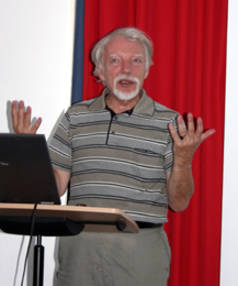
A MUSICAL OPENING TO ISU
July 21, 2006
Two guest lectures visited ECLA during the first week of International Summer University. On Monday, July 17th, Violeta Dinescu presented her lecture: 'On Tabu'. Dinescu has composed stage, orchestral, chamber, choral, vocal, and piano works that have been successfully performed and recorded across Europe. She wrote the film score for F.W. Murnau's Tabu, which was the film screening for Monday evening.
On Thursday, Prof. Dr. Dr. h.c. Jan Assmann gave a guest lecture entitled, 'Mozart's Magic Flute: Text and Context'. Assmann is a Professor of Egyptology at the University of Konstanz. He has written numerous books and essays on Egyptian religion, history, literature, and art and his recent works include a monograph on The Magic Flute.
ECLA's International Summer University Begins This Week
July 21, 2006
Students from fifteen different countries began class this week at ECLA's International Summer University. Under Western Eyes is the central theme of this Summer's programme and for the next six weeks students will examine Western perceptions of cultural otherness which shape the West's notion of itself. They will discuss questions related to this theme that are raised in their weekly readings and film screenings.
This first week, Jingfei Liang (ISU 2006, China) who currently attends Humboldt University in Berlin was struck by the diversity of opinions and ideas in her seminar. 'I especially like the discussion part. We are from varied backgrounds and it is interesting to see how people put in their own thoughts related to their own background. It's very inspiring for me.'
Andriy Kozlov (ISU 2006, Ukraine) who majors in Cultural Studies at Ukrainian Catholic University discovered during orientation that much can be learned just by living in a small international community. 'It is quite hard to find so many interesting people and at the same time good-willed people in the same place. The people are from different cultures and sharing their experience about the same things like Renaissance, globalisation, and films.'
ISU began on Wednesday, July 12th, with a five day orientation. Numerous social activities and city excursions occurred during this period as students acquainted themselves with each other and Berlin. Sunday was the Summer programme's official opening with academic orientation, a screening of Ingmar Bergman's The Magic Flute, and an evening reception for faculty and students.
The first week of class included guest lectures by German composer Violeta Dinescu and Prof. Dr. Dr. h.c. Jan Assmann in addition to the regular lectures and seminars by faculty. Readings for the week included Montaigne's On the Cannibals and On Coaches; selections from Pierre Clastres' Society against the State; Shakespeare's The Tempest; and Aimé Césaire's A Tempest. Students also attended film screenings of F.W. Murnau's Tabu and Fernando Meirelles' City of God.

- Alina Cibea (ISU 2001, Romania)
ECLA Welcomes Back Alumni at Reunion Weekend
July 6, 2006
In the middle of World Cup madness, ECLA welcomed close to 100 alumni back to campus for its first-ever alumni reunion. The majority of attendees came from Europe, but several alumni like Kenny Tan (ISU 2004, Singapore) and Anisa Shaikh (AY 2004, Pakistan) traveled long distances to attend the weekend event. Alumni were assigned to rooms in ECLA's three student houses and even alumni who currently reside in Berlin elected to sleep on-campus in order to relive the ECLA experience.
All meals and most of the weekend activities took place in an event tent in the gardens of the student houses. However, alumni did not escape the lecture hall entirely; Programme Directors Peter Hajnal and Thomas Norgaard held a panel discussion there on Friday where they answered questions concerning ECLA's future. The alumni who attended were most interested in ECLA's accreditation process and how the college would develop its Academy Year and Project Year programmes into a four-year curriculum.
The two-hour discussion might have lasted much longer if it weren't for the World Cup. Alumni headed back to the tent in time to watch the Germany - Argentina match on a big screen. After Germany had safely advanced to the semi finals, the evening buffet was opened. Director of Alumni Relations Dick Shriver provided some dinner entertainment and evoked many fond memories with his slideshow presentation: 'A Pictorial History of ECLA'. After dinner, alumni took turns singing their favorite songs at a late-night Karaoke party.
On Saturday, faculty member Dan Vyleta presented a new variation of his popular jazz seminar in the event tent. Later that afternoon, alumni enjoyed the warm weather while chatting and playing football in the student gardens. President Larry Boetsch gave the weekend's key note address at dinner on Saturday. Later in the evening, alumni members of ECLA's bluegrass band entertained the audience with a short set and Hannes Kannicht (AY 2006, Germany) played a few songs off of his recently recorded album etude. After his set, Kannicht opened the stage to all alumni and the evening turned into a giant open mike session.
The reunion weekend ended on a low-key note Sunday afternoon. Alumni enjoyed a barbeque brunch while watching old student movies from their days at ECLA. Stephan Hilpert (FYP 2003, Germany) also screened the film, Wiedersehen, which he wrote and directed after leaving ECLA.
Alumni are an important part of the ECLA community and college faculty and administration were pleased to reunite with representatives from all six years of ECLA's existence. ECLA is working to build its alumni programme and intends to have more reunions in the future.

- Brindusa Birhala (AY 2006, Romania)
AY and PY Students Celebrate the End of the Academic Year
June 23, 2006
This week ECLA bid farewell to a class whose unique character will be sorely missed. The forty-five students of this year's AY and PY programmes brought an abundance of knowledge and talent to campus last Autumn, which was quickly uncovered during seminar groups and extracurricular activities. On June 21st, faculty, administration, and special guests gathered in Rathaus Pankow to celebrate the end of ECLA's fourth academic year and to wish the class of 2006 good luck in their future endeavors.
The ECLA Choir opened the ceremony with three short pieces before President Laurent Boetsch took the stage to extend a warm welcome to everyone in attendance and introduce ECLA's invited speaker Mayor Burkhard Kleinert of Berlin-Pankow. Mayor Kleinert expressed his appreciation for ECLA's ongoing relationship with the Pankow district - a relationship that has proven to be mutually beneficial over the years. Provost Emeritus Dick Shriver gave an often humorous key note address in which he urged students to 'follow their bliss' once they left ECLA.
As usual, the student speakers were the most popular part of the ceremony. Brindusa Birhala (AY 2006, Romania) and Violeta Sacara (PY 2006, Moldova) had been nominated beforehand to speak on behalf of their respective programmes. However, both students broke with tradition and chose other mediums to convey their feelings at the end of the year. Birhala recited the poem Song of Childhood by Peter Handke and related it to the ECLA experience. Sacara sang Hands by Jewel with Lucian Cosinchi (PY 2006, Romania) accompanying her on guitar, and then left the audience with just a few poignant words before returning to her seat. After so many speeches, the Programme Directors Peter Hajnal and Thomas Norgaard kept their remarks short before awarding programme completion certificates to the members of the class of 2006.
Following the ceremony, everyone reconvened in the garden of Waldstraße 70 for a reception that continued into the early evening. The yearbook crew, Julian Triandafyllou (AY 2006, U.K.); Mimoza Gojani (AY 2006, Kosovo); Nicole Busse (AY 2006, U.S.A.); Nadzeya Kernoha (AY 2006, Belarus); and Adrian Nicolae (AY 2006, Romania), distributed the 2006 Yearbook shortly after dessert had been served, allowing everyone to reminisce over an eventful year while devouring tiramisu and apple strudel.
The day's official programme ended with a concert in the lecture hall where Nadzeya Kernoha (AY 2006, Belarus), Hannes Kannicht (AY 2006, Germany), Johanna Lerch (AY 2006, Germany), and Maria Mocanu (PY 2006, Moldova) performed the pieces they have been working on in their voice classes with ECLA's Choir Director Michael Geisler.

ECLA Invites Chamber Ensemble from Yale University to Perform in Pankow
June 9, 2006
ECLA hosted the Hindemith Ensemble from Yale University (Connecticut, U.S.A.) for three days this week. The nine-member chamber ensemble lived on campus, while they rehearsed for the inaugural concert of their first-ever international tour. The free concert took place Thursday evening in the Gemeindehaus on Breite Straße, Berlin-Pankow. Senior Assistant to the President Tomaz Cebasek arranged the musical event, which was attended by students, faculty, alumni, friends of the college and the Pankow community at large.
The Hindemith Ensemble performed three pieces including Variations for an Odd Band, an original piece by ensemble member Timothy Andres; Mozart's Clarinet Quintet in A. K. 581; and Paul Hindemith's Oktett.
The nine-member group chose Germany for their first international tour because they take their name from Paul Hindemith (1895-1963), the German composer who emigrated to the U.S. just before World War II and taught at the Yale School of Music for thirteen years. The group will spend a month touring around Germany with more public performances scheduled for Mannheim and Heidelberg.

ECLA GUEST LECTURE: Marvin Carlson Gives Guest Lecture as Part of ECLA's Performance Elective
May 23, 2006
On Friday, May 19th, Marvin Carlson gave a guest lecture at ECLA entitled, 'Speaking in Tongues: Multiple Languages on the Modern Stage'. The lecture was most relevant for students taking David Levine's Performance elective this term: Acting Shakespeare.
Carlson is the Sidney E. Cohn Distinguished Professor of the Graduate Center of the City University of New York, a Fellow of the American Theatre, and doctor of letters, honoris causae, of the University of Athens.
ECLA Prepares for its First Alumni Reunion
May 23, 2006
This summer over a hundred alumni will return to Berlin and reunite with former classmates and professors during ECLA's first-ever Alumni Reunion, scheduled to take place June 29 - July 2, 2006. At the opening dinner on Friday, President Laurent Boetsch and Provost Emeritus Richard Shriver expect to welcome alumni and professors from every Summer and full-year programme between 2000 and 2005.
Dr. John McLaughlin has been invited to address participants at a festive dinner on Saturday evening. McLaughlin is the creator, executive producer, and host of the popular public affairs program, The McLaughlin Group. The highly-rated American show also airs internationally on CNBC-Europe. McLaughlin's sense of humor and extensive background in international journalism lends to the success of the show; these same qualities also promise for an engaging talk at reunion.
Alumni will have the opportunity to attend special seminars and a variety of social events during the three-day weekend, however, the programme remains flexible in order to allow as much time as possible for reacquainting with old friends.
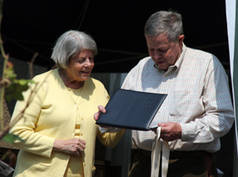
- Barb and Dick Shriver accept an award
ECLA Throws a Surprise Celebration in Honor of Provost Emeritus Richard Shriver and His Wife Barbara Shriver
May 8, 2006
On May 6, ECLA thanked Dick and Barb Shriver for their years of commitment to the college in an intricate surprise celebration involving the entire ECLA community.
The Shrivers moved to Berlin in 2002 when Dick took over as College Provost. He led ECLA for three years, which saw the development of the Academy Year and Project Year curricula; the introduction of State of the World Week and the Business Seminars into the academic year; the inception of ECLA's Alumni Programme; and enormous improvements in the campus and in the residential life of the college. Together Dick and Barb started ECLA's bluegrass group, 3 Chords and the Truth. Barb's energy and enthusiasm during bluegrass jam sessions, choir rehearsals, and impromptu dinners at the Shriver house have made her very popular with the students ever since she arrived on campus. Barb is also ECLA's first archivist.
The festivities began early Saturday morning when the entire ECLA community and some special guests gathered at the end of Kuckhoffstraße for a historical tram ride through Berlin. A vintage tram picked the group up and stopped again two stations later where the Shrivers were expecting to board the regular M1 for brunch in Prenzlauer Berg. They were completely surprised by the "ECLA Tram" and delighted to find their two sons, both live in the U.S., among the passengers.
The celebration continued in the garden of Waldstraße 70, where guests enjoyed the beautiful spring weather, live music and a delicious buffet prepared by ECLA's gourmet chef Roger Langkamp and his team. During the luncheon, ECLA President Laurent Boetsch, Mayor Burkhard Kleinert of Pankow, President of the Christian A. Johnson Endeavor Foundation Julie Kidd, and PY Programme Director Thomas Norgaard all thanked the Shrivers for their dedication and service to the college.
Dick Shriver's tenure as College Provost ended last summer and since then he has been teaching the electives: Global Affairs and Persuasive Oratory, while also serving as the Director of Alumni Relations and coordinating the Business Seminars. The Shrivers return to the U.S. in July but will continue their work for ECLA from afar.
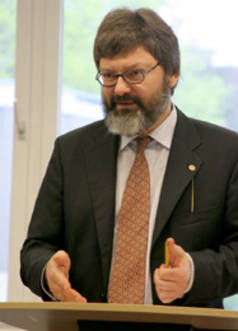
ECLA GUEST LECTURE: Heinrich Meier on Rousseau's Les R veries du Promeneur Solitaire
April 25, 2006
On Monday, April 24, Professor Heinrich Meier presented his lecture: 'Les R veries du Promeneur Solitaire - Rousseau on the Philosophical Way of Life.'
Professor Meier is professor of Philosophy at Ludwig-Maximilians-Universität München. He is also director of the Carl Friedrich von Siemens Stiftung. In 2005 he was awarded the Leibniz-Medaille der Berlin-Brandenburgischen Akademie der Wissenschaften.
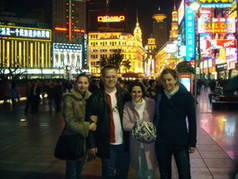
- Violeta Sacara (PY 2006, Moldova), Evgeny Morozov
ECLA Attends Harvard WorldMUN Conference in China
April 12, 2006
By Evgeny Morozov (PY 2006, Belarus), Violeta Sacara (PY 2006, Moldova), Paula Muenkler (AY 2006, Germany) and Elif Keskiner (AY 2006, Turkey)
Harvard World Model United Nations is a Harvard University student-run organisation that offers one of the most authentic Model United Nations experiences possible, thanks to its 1000 delegates from over fifty countries and its itinerant location. Each year the conference is hosted in a new location and participants are divided into eighteen simulated committees of the United Nations to discuss issues currently facing the international community.
ECLA attended Harvard WorldMUN for the first time this year. The conference was held in Beijing, China, in cooperation with Peking University. The ECLA delegation, representing the country of Guatemala, included Evgeny Morozov (PY 2006, Belarus), Violeta Sacara (PY 2006, Moldova), Paula Muenkler (AY 2006, Germany) and Elif Keskiner (AY 2006, Turkey).
This year WorldMUN had 1,380 participants from thirty-seven different countries. The week-long conference was very professionally organized and combined committee sessions with various social events. The registration of delegations and opening ceremony took place on Monday, March 27th. Seven committee sessions were spread over the next five days and the conference ended with a closing ceremony on Friday afternoon.
The ECLA delegation was assigned to four committees: Historical General Assembly (Paula), United Nations High Commissioner for Refugees (Elif), United Nations Commission on Human Rights (Violeta) and United Nations Development Program (Evgeny). After some long disputes and amendments, all of our committees (consisting of 60-90 people each) managed to adapt a resolution. Even though we voted against two of these resolutions it was still nice to produce a final paper.
Harvard WorldMUN 2006 was a great experience for all of us, both as a conference and as a trip to one of the world's most distinct cultures. In addition to the intense academic program at the conference, we also had a chance to enjoy the various cultural dimensions of vibrant Beijing and Shanghai (which we visited prior to the conference). We managed to observe the Chinese way of life and its diversity, wandering through the small streets of Hutongs (traditional Chinese streets) as well as modern and dynamic streets that were full of life, business and the spirit of globalisation.
Everything was new for us-from cuisine to the language (communication was particularly challenging since few of the people we met spoke English) and from bargaining in the streets to public transportation. It was an amazing learning experience as we had to cope with new facts every single day. The well-planned social component of the conference-with the two trips to the greatest sights in China (the Great Wall and the Forbidden City)-allowed us to gain a much better understanding of Chinese history and traditions.
It was also particularly amazing to meet five ECLA alumni in China, two of them Chinese. They were extremely helpful in making our trip so enjoyable. We were really proud to be part of the same ECLA family.

Students Come Home to New Computers
March 30, 2006
ECLA upgraded the computer labs in all student houses while residents were completing their Winter term in Rome. Eighteen slick new Dell GX520 computers were installed to replace the existing Athlon XP 2.200+ machines.
ECLA's Network Administrator, Marco Volkmann, carried out the installation, which is the first of a series of upgrades planned for the future.

- Anthony Grina lectures on finance
ECLA Offers Business Seminars during Semester Break
March 30, 2006
As they did last year, Richard Shriver, Anthony Grina and Bruce MacDonald are team teaching the ECLA Business Seminars this Spring. Each instructor leads a different phase of the thirteen-day programme, which introduces students to the business and entrepreneurial skills needed to be successful in either the not-for-profit or for-profit world. In phase I, Shriver provides students with an overview of the programme and a basic foundation in business. Grina teaches finance and business planning in phase II and MacDonald instructs students in marketing communications in phase III.
In addition to the teaching team, several guests lecturers have provided insights into the real world of business, including Andreas Krebs, managing director of Wyeth Pharma GmBH, who spoke on, 'Challenge, Charisma, Change - Leadership makes the Difference'.
Most participants select their individual or team project long before the first seminar. Over the course of the programme, this initial idea is developed into a hypothetical but realistic business plan as students implement their classroom learning. The final presentations of business plans take place on Friday, April 7, and reflect the programme's main theme, 'How to Make a Profit - or - How to Make a Difference'. Ludwig Kannicht (Germany) took the business seminars because he hopes to expand his existing website development business, 'Luline'. Maria Ituarte (PY 2006, Mexico) is discovering how one would start an NGO to promote cultural exchanges between Mexico and Germany.
The participants are mainly students currently enrolled at ECLA. In addition, the group includes one ECLA alumna, Theresa Li Han (ISU 2004, China), and five others who have had no prior association with ECLA.
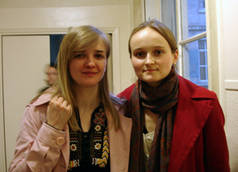
- Sofiya Skachko (ISU 2004, Ukraine) and Hanna
Conference on Belarus and Ukraine organized by ECLA alumna in Paris
March 20, 2006
By Sofiya Skachko (ISU 2004, Ukraine)
On March 20-25, 2006, Hanna Murauskaya (ISU 2004, Belarus), who is currently writing her PhD thesis at the Ecole normale supérieure in Paris, organized a Cultural Week of Belarus and Ukraine and conference (March 23-25) entitled: 'Ukraine and Belarus - what neighbors for the European Union?'
The timing was perfect since the Cultural Week and its conference took place just after the Belarussian presidential elections and on the eve of the Ukrainian parliamentary elections, making all the issues on the agenda highly relevant. Among the conference participants there were scholars of Ukrainian and Belarussian culture, history, politics, and languages from numerous countries; papers varied from the analysis of the present day political situation of these countries to very specific explorations of historical or linguistic peculiarities. Besides the conference, the Cultural Week included several events such as a concert by the Belarussian music group 'Nagual' and three movie screenings.
At the conclusion of the conference, the former president of the Belarussian republic, Stanislav Shushkevich, spoke to the participants about the concerns and hopes of the democratic opposition in Belarus. In response to the questions from the audience, he urged the West to help the Belarussian opposition in breaking through the information blockade. His talk resonated well with the paper delivered earlier in the conference by Mykola Ryabchuk, one of the most important Ukrainian literary critics and political commentators, who implicitly appealed for the West to pay more consistent attention to the democratic and pro-western tendencies in Ukraine.
Hanna not only organized and moderated the conference, she also spoke on the 'Identity constructions through the foundation of the first museums in Belarus and Ukraine before 1917,' this being the subject of her academic interest.
ECLA Completes Winter Term in Rome
March 10, 2006
Students, faculty and administration fly to Rome this weekend for the final week of Winter term. Dirk Deichfuss and Aya Soika have organized an eventful trip with a half dozen different tours planned on each of the five days in Italy. Most participants will choose to attend a morning and afternoon tour every day. The majority of the tours are led by ECLA faculty and they range from city walks such as Laura Scuriatti's 'Fascist Rome' to museum visits such as Tracy Colony's visit to Villa Borghese to site visits such as Dan Vyleta's walk through the Forum Romanum.
Excursions outside of the capital city have also been planned including a day trip to Florence and one to Tivoli. In Florence, ECLA will meet up with Federico Berti who gave two guest lectures earlier this term and is always happy to share the historical and artistic treasures of his home town with ECLA students. Peter Hajnal, Laura Scuriatti, and Aya Soika's Art History elective are also offering tours in the Renaissance city.
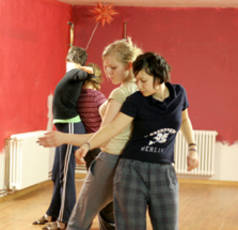
AY Student Brings Dance to ECLA
February 24, 2006
Last week, ECLA's modern dance workshop met for the first time. The class is the brainchild of Soledad Rodriguez (AY 2006, Argentina), who began looking for a way to bring the activity to campus almost as soon as she arrived last Fall. She noticed that other students shared her enthusiasm for dance, so she proposed the workshop as a student project and found an instructor, Stephanie Maher, living in Berlin. Maher is a dancer and choreographer, whose work has been performed in the U.S., Germany, Holland and the U.K. Rodriguez recently answered questions about the workshop:
Why did you decide to start a modern dance workshop at ECLA?
I love dancing, and I can't conceive of life without that activity. I also think that the experimental nature of modern dance is a great complement to the type of interdisciplinary work we do at ECLA. Fusing text and acting with movement, using the body as a vehicle to narrate, building and breaking structures; it is all about expressing and interpreting different types of meanings.
How would you define modern dance and what is it about this form of dance that appeals to you?
The type of dance we are doing in this workshop involves using sequences of movement as a point of departure to improvisation, that is to say, constructing and deconstructing structures through motion. I believe that improvisation in dance allows one to become more detached from the awareness of dancing or performing, and connects the body with the instant, with the very moment of creation, making the dancing more "organic". I enjoy this approach much more than other more rigid or structured ones.
Besides modern, what other forms of dance have you done?
In Buenos Aires I did a Butoh dance workshop (Japanese contemporary dance). Also, I took salsa and meringue classes and jazz dance when I was in primary and high school.
Do you need dance experience to take the workshop?
No, not at all. The kind of work we are doing does not presuppose any previous training or experience.
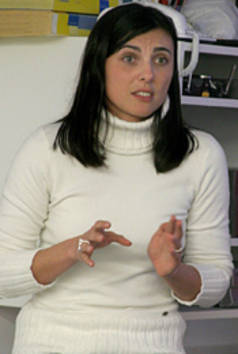
ECLA GUEST LECTURE: Dr. Marina Della Giusta Discusses Globalisation
February 24, 2006
Dr. Marina Della Giusta led the Global Issues elective on Thursday, February 23rd, where she presented her lecture: "Faraway So Close: Critical Issues in Globalisation".
Della Giusta is a Lecturer in Economics at the University of Reading. She has written numerous articles on economics of trust and social capital, and economics of gender. Much of her lecture built on issues discussed in the book, Critical Perspectives on Globalisation, which she co-wrote with U.S. Kambhampati and R.H. Wade. Della Giusta is currently working on another book, Prostitution: A Denied Industry, which will come out in 2007.

- Horst Bredekamp answers
ECLA GUEST LECTURE: Horst Bredekamp Gives Guest Lecture as Part of Italy Preparation
February 10, 2006
On Wednesday February 8th Professor Horst Bredekamp presented his lecture: "The Political Iconography of the Piazza Signoria in Florence." Professor Bredekamp currently teaches at Humboldt University here in Berlin. He has held visiting positions at the Institute for Advanced Study, Princeton (1991), the Wissenschaftskolleg, Berlin (1992), and at the Getty Center, Los Angeles (1995 and 1998). He is the recipient of the Sigmund-Freud-Prize (2001), the Aby-Moritz-Warburg-Prize (2004) and the Max-Planck-Forschungspreis (2006). His most recent publications include Darwins Korallen (2005) and Die Fenster der Monade. Gottfried Wilhelm Leibniz' Theater der Natur und Kunst (2004).
ROME TRIP PREPARATIONS BEGIN
January 25, 2006
Although most of the week will take place in Rome, two separate day trips to Florence and Tivoli are being planned. In preparation for the trip, guest professors Federico Berti and Horst Bredekamp will give lectures on February 2 and February 9, respectively. Berti's lecture is entitled, 'Artistic Patronage in Florence: The Medici' while Bredekamp will discuss 'the Symbology of Piazza della Signoria in Florence'.
This is the third consecutive year that a trip to Rome has been incorporated into the academic calendar. The trip complements work done in the classroom with an onsite exploration of political and art history.
Temperatures in Berlin dropped to the negative teens this week and with more snow forecasted over the next few days, it's no wonder that ECLA students are looking forward to spending the last week of Winter semester in Rome. While Dirk Deichfuss and Aya Soika are the main coordinators of this year's trip, all faculty will offer daily excursions once in Rome and students are taking an active role in the logistics planning.
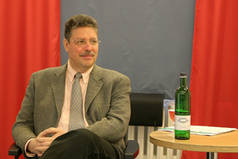
ECLA GUEST LECTURE: Glenn Most on 'Dante's Greeks'
January 16, 2006
Glenn Most gave a guest lecture this morning as part of the Academy Year core course. AY students are currently studying Dante's the Divine Comedy.
Professor Most teaches at the University of Chicago's Committee on Social Thought and at the Scuola Normale Superiore di Pisa. His most recent book: Doubting Thomas was published last Autumn by Harvard University Press.
